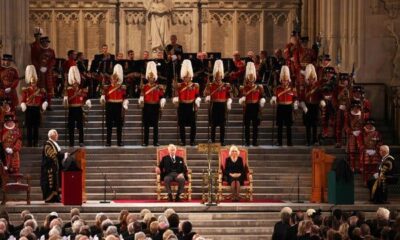The News
A Royal Reckoning: Tensions Rise as King Charles and Prince William Clash Over Monarchy’s Future
The British monarchy is facing a pivotal moment, with tensions simmering just beneath the surface.
King Charles III has reached out to his eldest son, Prince William, expressing deep concerns over a controversial plan that could fundamentally alter the royal family.
As William gears up for his future role as king, a power struggle is brewing, one that threatens to reshape not only the monarchy but also the personal relationships within it.
At the heart of this unfolding drama is Catherine, the Princess of Wales.
Her evolving role is drawing considerable attention as insiders reveal that William, who has been quietly preparing for kingship for years, has crafted a bold strategy for the royal family's future.
This plan, reminiscent of Queen Elizabeth II's vision for a streamlined monarchy, reportedly involves reducing the number of working royals and distancing the family from those who no longer fit into this new framework.
Among the most contentious aspects of William's proposal is the potential sidelining of extended family members, including Prince Andrew, Prince Harry, and even Princess Beatrice.
These individuals have long been fixtures in the royal landscape, but William appears determined to focus on those actively engaged in royal duties, which raises eyebrows and concerns about family dynamics.
For King Charles, grappling with this news has been emotionally taxing.
Although he recognizes the necessity for modernization within the monarchy, the prospect of further fracturing family bonds weighs heavily on him.
After decades spent trying to unify the Windsors, he now faces the unsettling reality that his son's vision could lead to deeper divisions.
As rumors of William's plans circulated, sources close to the palace disclosed that King Charles made a heartfelt appeal to his son.
The king, known for his unwavering sense of duty and loyalty, is reportedly devastated at the thought of severing ties with Prince Harry and other relatives.
He has urged William to reconsider his harsh approach, fearing it could inflict lasting damage on both their family and the institution they represent.
In a rare display of vulnerability, Charles confessed to William that the ongoing family feuds have already taken a toll, impacting public perception of the monarchy.
Concerns about his health further complicate matters, as palace insiders suggest that the king is genuinely worried about the future of the monarchy under William's leadership.
Amidst this turmoil, Catherine has emerged as a surprising player in the royal restructuring.
Once viewed primarily as a supportive figure, she is now taking on a more central role, reportedly not only backing William's vision but actively contributing to its development.
Known for her poise and commitment to the royal family, Catherine is seen as a crucial advisor, emphasizing the importance of modernizing the monarchy to keep it relevant.
Behind closed doors, Catherine is said to be deeply engaged in discussions about the family's future, offering insights on managing public perception and maintaining the monarchy's appeal.
Her rising popularity among the British public has solidified her influence, positioning her as a key figure in shaping the royal family's direction.
As William's vision unfolds, uncertainty looms over the futures of Prince Harry and Prince Andrew.
Harry, who has openly expressed his struggles with royal life, may find his relationship with the family increasingly strained under William's streamlined model.
Similarly, Andrew's status has plummeted due to past scandals, and it seems William's plan confirms what many have suspected: his prominence within the royal family is waning.
Royal commentators warn that this internal conflict could have significant implications for the monarchy.
Should William proceed with his ambitious plan, it could signal the most dramatic transformation of the royal family in decades.
Conversely, if King Charles' emotional plea resonates with William, the monarchy might navigate a path that balances modernization with tradition.
While some view William's approach as ruthless, others argue that it is essential for the monarchy's survival.
In an era demanding greater accountability and reform, a streamlined royal family might be the key to securing public support in the 21st century.
Catherine's involvement in this transition is largely welcomed, as her influence is seen as a positive force for change within the royal family.
As King Charles confronts the emotional weight of his son's bold vision, the future of the monarchy hangs precariously in the balance.
Will William's ambitious plan for a leaner royal family take root?
Or will Charles' heartfelt plea for unity prevail?
One thing is clear: the British monarchy stands on the brink of a new chapter, where today's decisions will shape its legacy for generations to come.
















































































